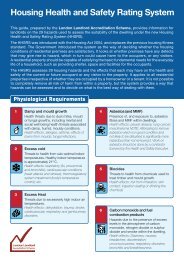Spring Issue - Camden Federation of Private Tenants
Spring Issue - Camden Federation of Private Tenants
Spring Issue - Camden Federation of Private Tenants
Create successful ePaper yourself
Turn your PDF publications into a flip-book with our unique Google optimized e-Paper software.
The <strong>Camden</strong> <strong>Private</strong> Tenant www.cfpt.org.uk 3News in BriefGoodbye CORGIFrom 1st April 2009, Gas Safe Registerreplaces the CORGI gas registrationscheme as the <strong>of</strong>ficial gas safetyorganisation.So, from 1st April, by law, only Gas Saferegistered engineers should carry outwork on gas appliances or installationsin your home.If someone other than a Gas Safeengineer does work in your home, you,your family, fellow tenants or your homecould be at risk.They can be contacted on 0800 4085500 or go to www.gassaferegister.co.ukTop Ten Most ExpensiveAreasNewly published research from TheDeposit Protection Service (DPS) showsthat Westminster is the most expensivearea in the UK to rent, measured bythe average deposit demanded bylandlords.It comes in at a whopping £1,890 (asat Dec 2008) compared to <strong>Camden</strong>’s£1,376, which makes it the 10th mostexpensive.According to the DPS “What it doesshow is that at a time when houseprices are plummeting, rental values areholding up comparatively well.”Since 6th April 2007, every landlord orletting agent who takes a deposit froma tenant has to use one <strong>of</strong> the threeschemes run by The Deposit ProtectionService (DPS), The Dispute Service ormydeposits.<strong>Private</strong> Renting isGrowing FastLove it or hate it - the private rentedsector has been expanding at anunprecedented rate since 1988. Prior to1988, a lack <strong>of</strong> freely available supplymeant that renting was a limited tenureoption and the choice <strong>of</strong> just 9.1% <strong>of</strong>all households. By 2008, 13.9% <strong>of</strong> allEnglish homes were privately rented.In <strong>Camden</strong> this figure is between 23-25% which puts it third out <strong>of</strong> all theLondon boroughs. Only Westminsterat 30% and Kensington and Chelseaat 25% have higher levels <strong>of</strong> privaterenters.Freedom <strong>of</strong> Information?The Freedom <strong>of</strong> Information Act 2000created a general right <strong>of</strong> access toinformation across the public sector.However, despite housing associationsand other registered social landlordshaving received millions <strong>of</strong> what werecouncil homes, <strong>of</strong>ten at minimal cost;together with receiving tens <strong>of</strong> millions<strong>of</strong> pounds <strong>of</strong> Housing Benefit each year,they remain wholly unaccountable inany meaningful sense to the public, arenot currently subject to the Freedom <strong>of</strong>Information Act or to any other form <strong>of</strong>open public scrutiny.We therefore petition the Prime Ministerto subject all housing associationsto the provisions <strong>of</strong> the Freedom <strong>of</strong>Information Act 2000.Petition submitted by StephenGradwick. To sign it go to http://petitions.number10.gov.uk/foi-housing/Service ChargeAccountant FinedLeaseholders are being advised to checkwhether the accountant who signs theservice charge certificate for their blockis actually qualified to do so. Section 28<strong>of</strong> the Landlord and Tenant Act 1985requires it to be signed by a qualifiedaccountant who is also a qualifiedauditor. Joseph Bloomberg <strong>of</strong> Suite 109,Atlas Business Centre, Oxgate Lane, NW27HJ was fined £1,000 by the Institute <strong>of</strong>Chartered Accountants and ordered topay costs <strong>of</strong> £2,367 for signing servicecharge certificates when not qualified asan auditor. He signed accounts for over40 blocks <strong>of</strong> flats.Who’s Responsible?Which? (formerly the Consumers’Association) recently asked it’s memberswho rent a home the question: Whois responsible for repairs – 43% didn’tknow or got it wrong.Mark McLaren from the campaignsteam said “It’s really worrying how littletenants know <strong>of</strong> their rights”. He wenton to add “A basic consumer principle isthat people have information to knowwhat’s good and what’s not; the rentalmarket seems to fail this test.”Makey-up world <strong>of</strong>letting agentsPatrick Collinson, Editor <strong>of</strong> the Moneysection in the Saturday Guardianrecently wrote: “I love the makeyupworld <strong>of</strong> letting agents and theirpreposterous fees. The huge finder’sfee to landlords and as much as £400to tenants for “administration” – whichamounts to a few pieces <strong>of</strong> photocopiedcontracts. A credit check fee (£150?). Aninventory fee (£80?). An insurance fee. Achecking out fee. A cleaning fee.”“They simply make up these charges asthey go along, hoping that the mainlyyoung clientele think they have nochoice but to pay up. These vulnerableyoung people, <strong>of</strong>ten laden with studentdebt, are hit with a load <strong>of</strong> tripe. Theyare spurious items which, if they haveany basis in fact, should fall on thetenant, not the landlord.”The good news is, it looks like thereis universal acceptance (even fromthe letting and managing agentsthemselves) that standards are poor andstaff are <strong>of</strong>ten unqualified. This couldlead to their mandatory regulation inthe near future.




